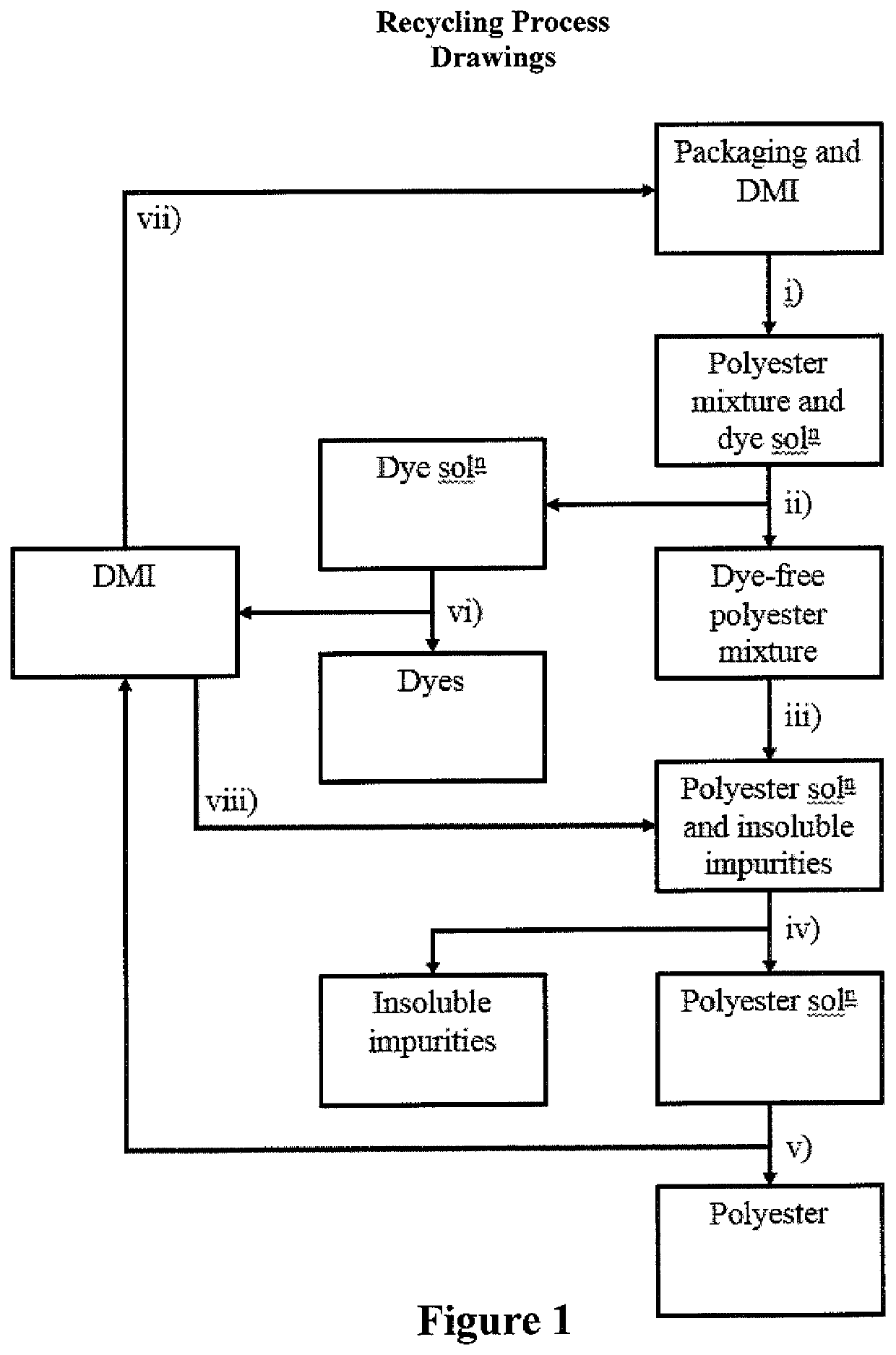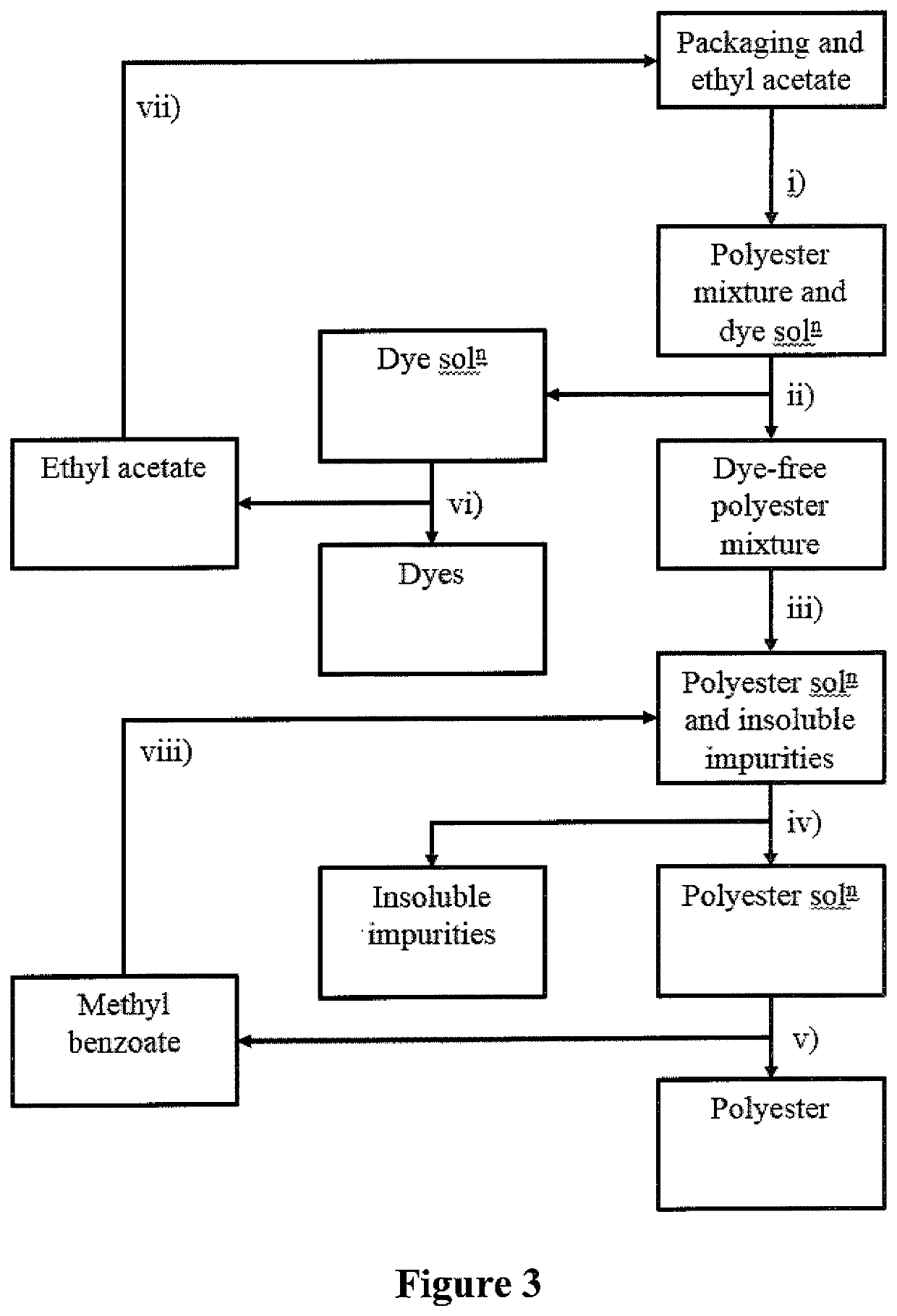Recycling process
a recycling process and packaging technology, applied in the dyeing process, application, other domestic articles, etc., can solve the problems of increasing the overall cost of the recycling process, difficult to separate from the dyes they are modified, etc., to reduce the amount of waste solvent, and minimise the amount of solvent required
- Summary
- Abstract
- Description
- Claims
- Application Information
AI Technical Summary
Benefits of technology
Problems solved by technology
Method used
Image
Examples
example 1
Dissolution of Bottle Grade poly(ethylene terephthalate) (PET) in ethyl benzoate
[0115]Ethyl benzoate (>99%, Sigma Aldrich, 250 mL) was placed in a 1 litre round bottomed flask equipped with reflux condenser and magnetic stirrer and heated to 120° C. with stirring on a hot plate. Mixed post-consumer PET chip from plastic bottles (10 g, mixture of colourless, blue and green) was added to the solvent and the mixture was stirred for 30 minutes at 120° C. Over this period, the solvent was observed to turn green in colour owing to the leaching of dyestuffs. The PET was heavily permeated and swollen by the solvent but did not dissolve to a significant extent. The mixture was then heated to in the range 180-200° C. for a further 2 hours, with stirring, over which period the solid PET was observed to entirely dissolve, yielding a clear green solution. Heating was discontinued and the solution was allowed to cool to room temperature, whereupon it solidified into a waxy polymer-solvent gel pha...
example 2
Dye Removal and Subsequent Dissolution of Post-Consumer Coloured poly(ethylene terephthalet) (PET) Textile in 1,3-dimethyl-2-imidazolidinone (DMI)
[0116]1,3-Dimethyl-2-imidazolidinone (DMI, >98%, FChemicals, 10 L) was placed in a 30 L glass jacketed reactor with overhead stirrer and condenser and heated to 100° C. with stirring. Mixed post-consumer 100% PET textile from shredded garments (500 g, mixture of white, red, purple, pink, blue, green and black) was added to the solvent and the mixture was stirred for 30 minutes at 100° C. Leaching of the dyestuffs into the solvent began immediately and was practically complete after 10 minutes. The textile was visibly swollen by the solvent but did not significantly dissolve, whilst the solvent became opaque and dark purple-black in colour. The hot solvent was then pumped off from the vessel, leaving the remaining textile as an off-white solid. Fresh solvent (10 L) was added to the vessel containing the polymer and heated to 160° C. with st...
PUM
| Property | Measurement | Unit |
|---|---|---|
| temperature | aaaaa | aaaaa |
| temperature | aaaaa | aaaaa |
| temperature | aaaaa | aaaaa |
Abstract
Description
Claims
Application Information
 Login to View More
Login to View More - R&D
- Intellectual Property
- Life Sciences
- Materials
- Tech Scout
- Unparalleled Data Quality
- Higher Quality Content
- 60% Fewer Hallucinations
Browse by: Latest US Patents, China's latest patents, Technical Efficacy Thesaurus, Application Domain, Technology Topic, Popular Technical Reports.
© 2025 PatSnap. All rights reserved.Legal|Privacy policy|Modern Slavery Act Transparency Statement|Sitemap|About US| Contact US: help@patsnap.com



